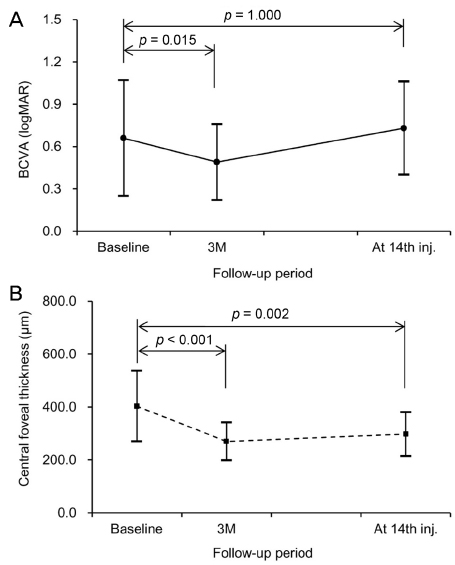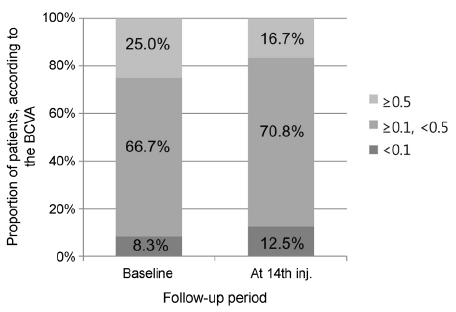J Korean Ophthalmol Soc.
2017 Sep;58(9):1042-1049. 10.3341/jkos.2017.58.9.1042.
Fourteen Anti-vascular Endothelial Growth Factor Injections for Age-related Macular Degeneration: Ending Period and Clinical Outcome
- Affiliations
-
- 1Myung-Gok Eye Resarch Institute, Department of Ophthalmology, Kim's Eye Hospital, Konyang University College of Medicine, Seoul, Korea. kjh7997@kimeye.com
- KMID: 2390067
- DOI: http://doi.org/10.3341/jkos.2017.58.9.1042
Abstract
- PURPOSE
To evaluate the clinical course of patients who had completed 14 ranibizumab or aflibercept monocular treatments.
METHODS
Retrospective medical record analysis was performed to 24 patients who were diagnosed with monocular neovascular age-related macular degeneration and had completed 14 ranibizumab or aflibercept monocular injections, allowed by the Korean National Health Care system. Time to completion was measured along with the percentage and timing of medication switch. Best-corrected visual acuity (BCVA) was measured at the time of diagnosis, after 3-loading injections, and the time of completion. Additionally, we searched for any other factors that had influenced the time to completion.
RESULTS
The average time to completion of 14 injections was 32.3 ± 6.2 months (21-48 months). The switching was performed in 17 eyes (70.8%), and it was done after 9.4 ± 2.1 injections (4-14 injections) with prior medication. After 14 injections, the BCVA improved in 6 eyes (25.0%), unchanged in 8 eyes (33.3%), and worsened in 10 eyes (41.7%). Complete resolution of intraretinal fluid and subretinal fluid after 3 loading injections were observed in 20 eyes, and it was significantly related to time to the first recurrence and time to the completion of 14 injections (p = 0.007, r = 0.583).
CONCLUSIONS
The average time to completion of 14 injections was 32.3 months, and switching of medication was performed in 70.8%. Longer time to the first recurrence was related to longer completion time. This study will provide useful facts when informing the patients their future treatment plans under the Korean Health Care system.
MeSH Terms
Figure
Reference
-
1. Park SJ, Kwon KE, Choi NK, et al. Prevalence and incidence of exudative age-related macular degeneration in South Korea: a nationwide population-based study. Ophthalmology. 2015; 122:2063–2070.e1.2. Bressler SB, Bressler NM, Fine SL, et al. Natural course of choroidal neovascular membranes within the foveal avascular zone in senile macular degeneration. Am J Ophthalmol. 1982; 93:157–163.3. Rosenfeld PJ, Brown DM, Heier JS, et al. Ranibizumab for neovascular age-related macular degeneration. N Engl J Med. 2006; 355:1419–1431.4. Brown DM, Kaiser PK, Michels M, et al. Ranibizumab versus verteporfin for neovascular age-related macular degeneration. N Engl J Med. 2006; 355:1432–1444.5. Heier JS, Brown DM, Chong V, et al. Intravitreal aflibercept (VEGF trap-eye) in wet age-related macular degeneration. Ophthalmology. 2012; 119:2537–2548.6. Kang S, Cho WK, Roh YJ. The efficacy of ranibizumab for choroidal neovascularization in age-related macular degeneration. J Korean Ophthalmol Soc. 2009; 50:725–730.7. Comparison of Age-related Macular Degeneration Treatments Trials (CATT) Research Group. Maguire MG, Martin DF, et al. Five-year outcomes with anti-vascular endothelial growth factor treatment of neovascular age-related macular degeneration: the comparison of age-related macular degeneration treatments trials. Ophthalmology. 2016; 123:1751–1761.8. Fauser S, Muether PS. Clinical correlation to differences in ranibizumab and aflibercept vascular endothelial growth factor suppression times. Br J Ophthalmol. 2016; 100:1494–1498.9. Steinbrook R. The price of sight--ranibizumab, bevacizumab, and the treatment of macular degeneration. N Engl J Med. 2006; 355:1409–1412.10. Fung AE, Lalwani GA, Rosenfeld PJ, et al. An optical coherence tomography-guided, variable dosing regimen with intravitreal ranibizumab (Lucentis) for neovascular age-related macular degeneration. Am J Ophthalmol. 2007; 143:566–583.11. Engelbert M, Zweifel SA, Freund KB. “Treat and extend” dosing of intravitreal antivascular endothelial growth factor therapy for type 3 neovascularization/retinal angiomatous proliferation. Retina. 2009; 29:1424–1431.12. Lalwani GA, Rosenfeld PJ, Fung AE, et al. A variable-dosing regimen with intravitreal ranibizumab for neovascular age-related macular degeneration: year 2 of the PrONTO Study. Am J Ophthalmol. 2009; 148:43–58.e1.13. Comparison of Age-related Macular Degeneration Treatments Trials (CATT) Research Group. Martin DF, Maguire MG, et al. Ranibizumab and bevacizumab for treatment of neovascular age-related macular degeneration: two-year results. Ophthalmology. 2012; 119:1388–1398.14. Jang HJ, Song SJ, Bae JH. Long-term effect of intravitreal ranibizumab injection on choroidal neovascularization in age-related macular degeneration. J Korean Ophthalmol Soc. 2013; 54:1359–1364.15. Bakall B, Folk JC, Boldt HC, et al. Aflibercept therapy for exudative age-related macular degeneration resistant to bevacizumab and ranibizumab. Am J Ophthalmol. 2013; 156:15–22.e1.16. Cho H, Shah CP, Weber M, Heier JS. Aflibercept for exudative AMD with persistent fluid on ranibizumab and/or bevacizumab. Br J Ophthalmol. 2013; 97:1032–1035.17. Kim JH, Cho NC, Kim WJ. Intravitreal aflibercept for neovascular age-related macular degeneration resistant to bevacizumab and ranibizumab. J Korean Ophthalmol Soc. 2015; 56:1359–1364.18. Kim KM, Kim JH, Chang YS, et al. Efficacy of three aflibercept injections for neovascular age-related macular degeneration showing limited response to ranibizumab. J Korean Ophthalmol Soc. 2017; 58:62–68.19. Moon DR, Lee DK, Kim SH, et al. Aflibercept treatment for neovascular age-related macular degeneration and polypoidal choroidal vasculopathy refractory to anti-vascular endothelial growth factor. Korean J Ophthalmol. 2015; 29:226–232.20. Maguire MG, Daniel E, Shah AR, et al. Incidence of choroidal neovascularization in the fellow eye in the comparison of age-related macular degeneration treatments trials. Ophthalmology. 2013; 120:2035–2041.21. Kim YT, Kang SW, Chung SE, et al. Development of polypoidal choroidal vasculopathy in unaffected fellow eyes. Br J Ophthalmol. 2012; 96:1217–1221.22. Chang YS, Kim JH, Yoo SJ, et al. Fellow-eye neovascularization in unilateral retinal angiomatous proliferation in a Korean population. Acta Ophthalmol. 2016; 94:e49–e53.23. Mantel I, Deli A, Iglesias K, Ambresin A. Prospective study evaluating the predictability of need for retreatment with intravitreal ranibizumab for age-related macular degeneration. Graefes Arch Clin Exp Ophthalmol. 2013; 251:697–704.24. Freund KB, Korobelnik JF, Devenyi R, et al. Treat-and-extend regimens with anti-VEGF agents in retinal diseases: a literature review and consensus recommendations. Retina. 2015; 35:1489–1506.25. Chin-Yee D, Eck T, Fowler S, et al. A systematic review of as needed versus treat and extend ranibizumab or bevacizumab treatment regimens for neovascular age-related macular degeneration. Br J Ophthalmol. 2016; 100:914–917.26. Wykoff CC, Croft DE, Brown DM, et al. Prospective trial of treat-and-extend versus monthly dosing for neovascular age-related macular degeneration: TREX-AMD 1-year results. Ophthalmology. 2015; 122:2514–2522.27. Rayess N, Houston SS, Gupta OP, et al. Treatment outcomes after 3 years in neovascular age-related macular degeneration using a treat-and-extend regimen. Am J Ophthalmol. 2015; 159:3–8.28. Mrejen S, Jung JJ, Chen C, et al. Long-term visual outcomes for a treat and extend anti-vascular endothelial growth factor regimen in eyes with neovascular age-related macular degeneration. J Clin Med. 2015; 4:1380–1402.
- Full Text Links
- Actions
-
Cited
- CITED
-
- Close
- Share
- Similar articles
-
- Treatment of Exudative Age-Related Macular Degeneration
- Intravitreal anti-vascular endothelial growth factor treatment for retinal diseases
- Intravitreal Anti-vascular Endothelial Growth Factor for Typical Exudative Age-related Macular Degeneration in Eyes with Good Baseline Visual Acuity
- Significance of Early Visual Responses to Anti-Vascular Endothelial Growth Factor in Age-related Macular Degeneration
- Intravitreal injection of anti-vascular endothelial growth factor for patients with various retinal diseases



